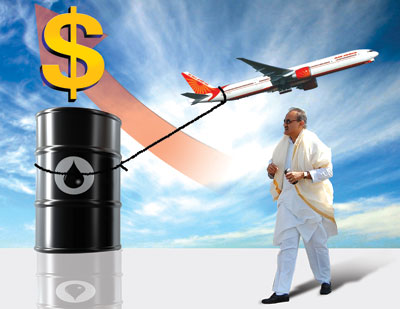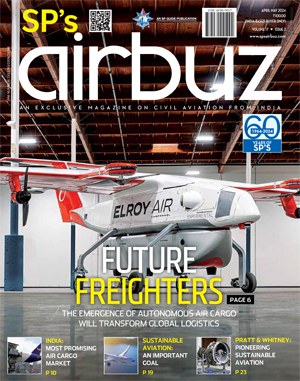Airlines - Dialogue Wins the Day
Buckling under mounting losses, representatives of India’s private airlines held detailed discussions with Union Civil Aviation Minister Praful Patel to sort out contentious issues

Indian private air carriers have appealed to the government to take speedy steps to reduce the burden of high sales tax on jet fuel and airport charges. Looking for ways to tide over the financial crisis that has affected the civil aviation sector, representatives of private airlines held detailed discussions with Union Civil Aviation Minister Praful Patel. The meeting was attended by the Federation of Indian Airlines (FIA) together with Civil Aviation Secretary M.M. Nambiar. The team from FIA comprised Kingfisher Airlines’ Chairman Dr Vijay Mallya, Jet Airways’ Naresh Goyal, GoAir’s Managing Director Jeh Wadia, Rahul Bhatia and Aditya Ghosh of IndiGo, SpiceJet CEO Sanjay Agrawal, Air India’s Chairman and Managing Director Arvind Jadhav and FIA Secretary General Anil Baijal. “Both the Civil Aviation Minister and the Secretary were sympathetic to our demands. Our discussions were held in a positive and constructive manner. I hope that the government will look at our difficulties and something will come out in the next four to six weeks,” Dr Mallya later told reporters.
Though there was no official word on what transpired at the meeting, the Civil Aviation Minister has made a detailed presentation before the Union Cabinet. “India’s per capita number of trips is 0.02, compared to 0.1 for China, which is five times higher, and 2.2 trips for the US. So there is a huge potential in our country,” Patel said. “Conservatively, my ministry has estimated—also assuming no further shocks—a growth of 8.5 per cent year-on-year for India’s aviation industry till 2015,” the minister said, adding, “India’s population in million per aircraft—and this is an interesting piece of statistics—is 2.89. The corresponding figure is 1.14 for China, 0.63 for Brazil, 0.31 for South Africa, 0.24 for Japan, 0.11 for Germany, 0.07 for Britain and 0.05 for the US. “This shows huge potential to increase aircraft penetration in the country, even when compared to (other) Asian countries.”
Speaking on aviation fuel, Patel sought to highlight how expensive it was in the country, resulting in this segment adding up to nearly 40 per cent of costs, compared to the 20 to 25 per cent global figure He said aviation fuel was costing 38,000 per kilolitre in India, as against 24,000 in Singapore, 25,000 in New York, 24,500 in Hong Kong, 25,000 in Bangkok, 26,000 in Tokyo, 26,500 in Paris and 26,000 in Dubai. Patel said while Andhra Pradesh was charging the lowest sales tax of 4 per cent on jet fuel, it was 28 to 30 per cent in Karnataka, Gujarat, Kerala, Tamil Nadu and West Bengal. “A 1,000 change in aviation turbine fuel price translates into 300 crore increase or decrease in the cost of operations of the sector,” he pointed out, further observing that fuel prices have seen a rise of 99.6 per cent over the past year or so. According to private carriers, their collective losses went up to $2 billion (10,000 crore) in the past year, while Air India has also accumulated similar losses, of which $1 billion (5,000 crore) was in 2008-09. Prime Minister Manmohan Singh has already set up a group of ministers to look into the woes of the industry.
Meanwhile, faced with public agitation and the government’s offer of dialogue, FIA called off a proposed one-day strike on August 18. Eight major private carriers, under the aegis of the FIA, raised a protest against high and irrational rate of sales tax on aviation turbine fuel (ATF) and steep airport charges. “Aviation fuel prices in India are among the highest in the world,” said Baijal, adding the private carriers owe nearly $500 million (2,425 crore) towards fuel to oil companies. When asked, the Civil Aviation Minister said the issue of tax on ATF is a state concern and “the aviation ministry has been requesting the states for the past few years to see reason”.





